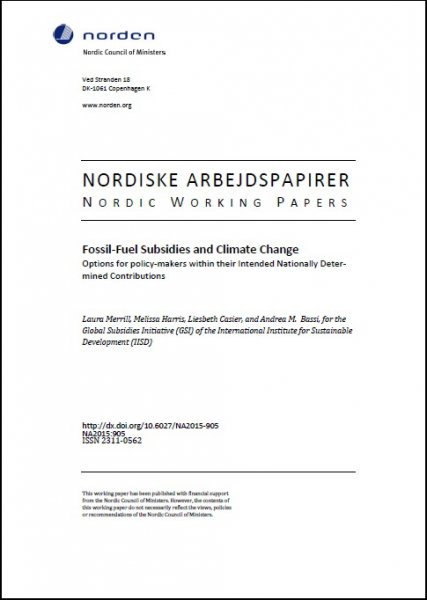Transport Emissions of non-Annex I countries larger than Annex 1 countries in next few years
The latest estimates from the International Energy Agency (IEA) indicate that the transport sector contributed nearly 23% of global CO2 emissions from fuel combustion in 2012. Transport, with an average annual growth rate of 2.0% from 1990-2012, is among the fastest growing sectors of CO2 emissions from fuel combustion.
Fossil Fuel Subsidy Reform can reduce Greenhouse Gas Emissions Globally by 6-13%
 A new report from the Nordic Council of Ministers and the Global Subsidies Initiative of IISD finds that the removal of fossil-fuel subsidies to consumers (US$ 543 billion in 2014) and to society could reduce global greenhouse gas (GHG) emissions by between 6-13% by 2050.
A new report from the Nordic Council of Ministers and the Global Subsidies Initiative of IISD finds that the removal of fossil-fuel subsidies to consumers (US$ 543 billion in 2014) and to society could reduce global greenhouse gas (GHG) emissions by between 6-13% by 2050.
UNEP Publishes Reports on Low Carbon Transport and City Planning in India
Three reports released by the UN Environment Programme (UNEP) evaluate and summarize options for low carbon city planning, non-motorised transport (NMT) and infrastructure risks due to climate variability in India. The reports were published as part of the project on ‘Promoting Low Carbon Transport in India.’
US, China Agree on Climate Change Mitigation Actions
The US and China agreed to five new action initiatives to reduce greenhouse gas (GHG) emissions and air pollution, focusing on: emission reductions from heavy-duty and other vehicles; smart grids; carbon capture, utilization and storage (CCUS); the collection and management of GHG emissions data; and energy efficiency in buildings and industry.
UN Under-Secretary-General Spells Out Next Steps to 'The Future We Want'
UN Under-Secretary-General for Economic and Social Affairs Wu Hongbo, in an editorial in the ‘Huffington Post,’ has outlined next steps following on the outcome of the UN Conference on Sustainable Development (UNCSD, or Rio+20), which concluded a year earlier in Rio de Janeiro, Brazil.
UN Reports GHG Emissions on Journey Towards Climate Neutrality
The UN has launched the fourth edition of Moving Towards a Climate Neutral UN, the annual progress report on the UN’s journey towards climate neutrality, which details the UN’s greenhouse gas (GHG) emissions in 2011 and some of the activities undertaken in 2012 to reduce them.
EEA 2013 Work Programme to Address Air Pollution, Climate Change, Energy
The European Environment Agency (EEA) released its “Annual Management Plan 2013” outlining the EEA work programme which will address a broad range of issues including: air quality and noise; air pollutant emissions; climate change mitigation; climate change adaptation; energy; and transport.
IEA Report Concludes Decarbonization of Nordic Countries Possible by 2050
The International Energy Agency (IEA) has published a report detailing how the Nordic region can become carbon-neutral by 2050. The report, titled “Nordic Energy Technology Perspectives: Pathways to a Carbon Neutral Energy Future,” is IEA’s first regional edition of its flagship publication series “Energy Technology Perspectives.”
ADB Finances "Green" Buses in People's Republic of China
The ADB project is supporting the expansion of “green” bus services in the People’s Republic of China, an initiative that will benefit low-income commuters, improve air quality and reduce GHG emissions. The initiative is in line with the $175 billion commitment made at the June 2012 UN Conference on Sustainable Development (UNCSD, or Rio+20) by multilateral development banks to improve transport in developing countries between 2012 and 2022.
